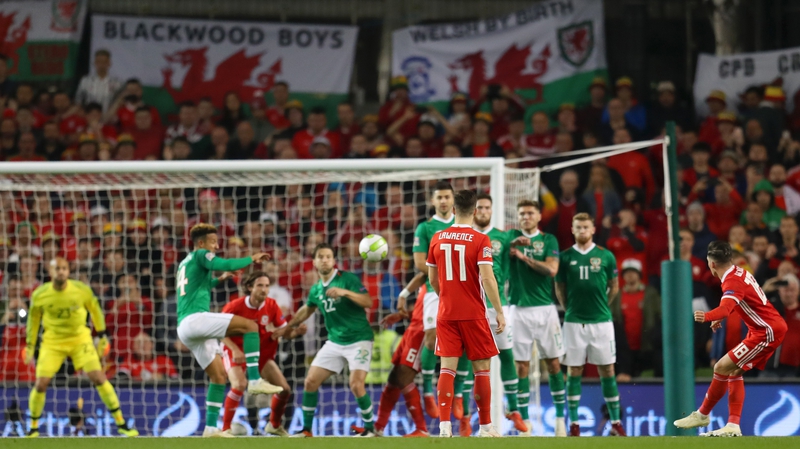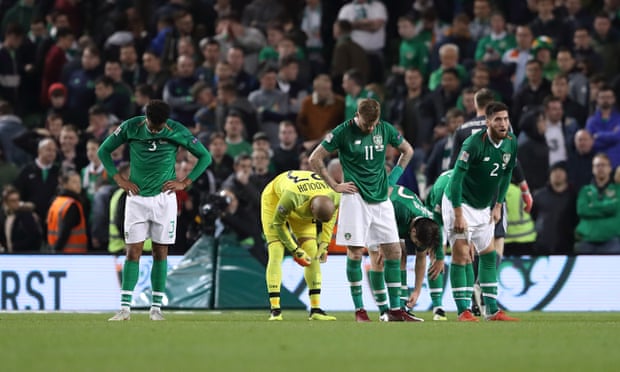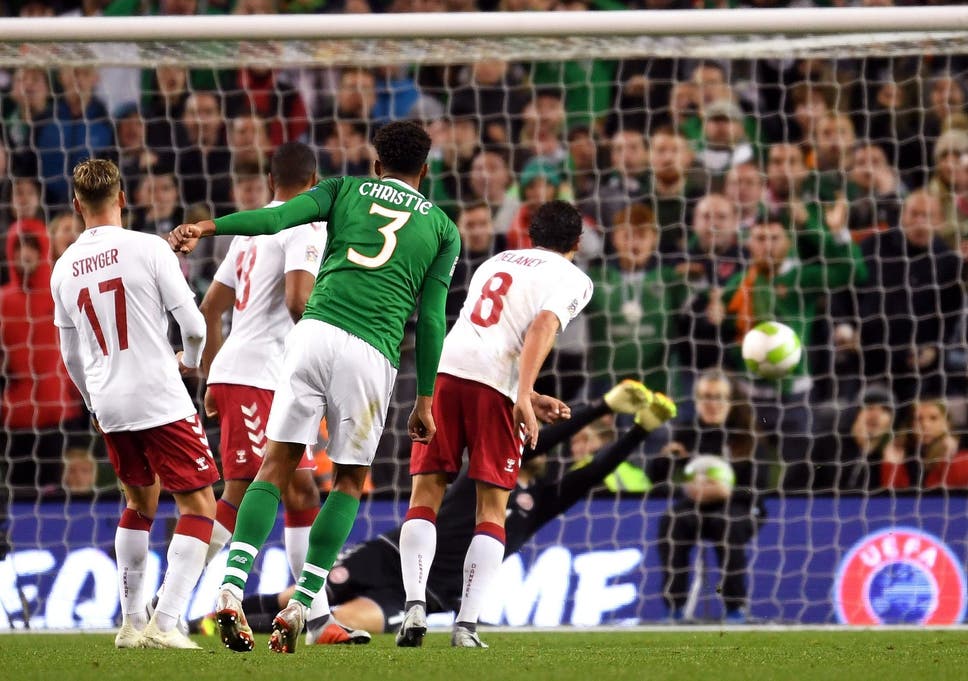The most frustrating aspect of Tuesday for me was that the first half was undoubtedly an improvement on what we had seen against Denmark on Saturday. Yet, once Wales went ahead, the old failings came to the fore once again as our play lost any semblance of shape in our attempts to salvage something. The chaotic nature of the last twenty minutes could as easily have resulted in a two or three goal slaughter rather than an equaliser. We ended up with neither and instead took another nick in what seems like a death by a thousand cuts for this regime.
There was still a bit of a matchday buzz around the city as we made our way over from the Northside with food and drink pit stops in Fagans, Mulligans and The Gingerman. But it was mostly coming from the Welsh fans dotted around the city and when we arrived at the Beggars, there was a lot more room than normal.
To be fair, it was a midweek game and once it got to an hour before kick-off, there were plenty of bodies milling around. However, I do wonder if the fact that so many tickets were given away for free through schoolboy clubs meant that a good chunk of the crowd was coming in with their kids for the match alone. I've no issue with anything that encourages the next generation of fans to come along but the sheer volume of tickets rumoured to be handed out does raise questions about how fair that is to those loyal supporters who pay for the dubious privilege of watching this team.
With Callum Robinson's cameo one of the bright points from Saturday's draw and rumours about Shane Long's level of fitness, it was no surprise to see Robinson named to start. Aiden O'Brien's performance in the Poland friendly had obviously been enough to see him given the nod in place of Callum O'Dowda who was suffering from concussion. Otherwise, it was the same team as three days before with the Cyrus Christie experiment in central midfield continuing.
Meanwhile, the loss of Gareth Bale and Aaron Ramsey had left Wales without their two best players. Ethan Ampadu, their Irish qualified young prospect who had done so much damage to us in Cardiff was also missing so the team Giggs sent out was hugely inexperienced with an 18-year-old, a 19-year-old and three 21-year-olds lining up. And for all the talk about the lack of Irish players playing in the Premier League, our team contained six players currently playing there compared to three for Wales.
The Welsh are a nation who know how to belt out an anthem and their rendition of Land of our Fathers was certainly rousing while the malaise around the Irish set-up seemed to have made its way into the stands with a half-hearted Amhrán na bhFiann bringing us to kick-off.
After the criticism of the overly defensive nature of Saturday's set-up, it was clear early on that our defensive line was further up the pitch, meaning that the formation looked more like the promised 3-5-2 as opposed to the five at the back that was consistently apparent against the Danes.
James McClean was getting forward well from his left wing-back position and had got stuck into both Joe Allen and David Brooks in the first six minutes before winning Ireland's first corner on eight.
The corner came to nothing but Ireland really should have taken the lead a minute later. Wales were playing the ball out at the edge of the box when a slip from Matthew Smith let Christie in on goal. A desperate swipe from Smith's trailing leg clipped the ball and forced Christie into a more central position and it may have been that which caused him to take it on first time when advancing closer on goal was the better option. Regardless, Wayne Hennessy in the Welsh goal scrambled back and the lack of pace on the shot meant he was able to push it past the post. It really was a gilt-edged chance and should have seen Ireland ahead.
A defensive error by Shane Duffy at the other end nearly let in Tom Lawrence for Wales' first chance but luckily the ref had spotted a handball and the game settled down in a bit of a nip and tuck manner again. While Wales had about 60% of the possession, neither side was in the ascendancy and it was definitely a better watch than the Denmark game. There were encouraging signs from the likes of Robinson and James McClean was looking more comfortable playing in the higher line, as was Matt Doherty.
However, comfortable saves from a Tyler Roberts shot and a Duffy header were the only real incidents of note until the 40th minute when Ireland actually managed to string a number of passes together and work the ball to Robinson in an encouraging position. Unfortunately, his shot from just outside the box was charged down by Lawrence.
And that was pretty much it for the first half. Nothing spectacular but a step up from the weekend and the hope was the second period would see it raised another notch.
While things did move up another notch after the break, unfortunately, it was Wales that did the raising as they started doing more with the possession we always cede to the opposition. The first ten minutes were uneventful enough bar the usual McClean booking and O'Neill was the first manager to blink with the ineffective O'Brien replaced by Shane Long on 56 minutes to a fairly indifferent response from the support. But he hadn't even had a chance to settle into things before the defining moment of the game.
It was a very rash decision from Harry Arter to go to ground as it looked like Tyler Roberts would be doing well to create a chance from an overhit pass. But go to ground he did and that was the start of a series of errors. Darren Randolph's wall was all over the place and you could clearly see the gap that Wales' Joe Allen was standing in from our vantage point at the other end of the ground.
Regardless of that gap, Harry Wilson's strike was fairly central and should have been meat and drink to the keeper even allowing for the fact that Robinson turned his back to it. Why Randolph thought it was a good idea to second guess Wilson and take a step to his left is beyond me but it left him stranded as the ball sailed in, to the delight of the Welsh fans behind that goal.
Mind the gap
Given the utter lack of a cutting edge these days (the only team Ireland have scored more than one against in a competitive game in the last two years is Moldova), it was hard to see where an equaliser would come from. But the approach that was taken to chase the game was scattergun in the extreme.
I don't know if it was the fact that he had turned his back on the ball in the wall but Robinson was hooked not long after despite looking like our biggest threat. Seanie Maguire replaced him. Given the two play together at Preston, would letting them play together not have been a better option than bringing a misfiring Shane Long on?
Long did find himself through on goal a few minutes later and was lucky he was rightly called offside considering he managed to hit the bar rather than the net with his finish.
The longer the game went on, the more desperate we seemed to become and any semblance of structure went out the window. A couple of Hendrick efforts were blocked. Scott Hogan was introduced replacing Kevin Long which seemed to leave us playing a 2-5-3 formation.
The harum-scarum nature of the game at this stage meant we were really susceptible to counter-attacks and Arter did well to get back and block Lawrence after losing the ball himself. James Chester put a header wide when he should have buried it. Lawrence and Roberts snatched at chances.
We were still creating the odd half chance but it was aimless stuff in the main. Maguire put a header into Hennessy's hands and Duffy lashed at a chance but put it well over. A couple of long throws were launched into the box and pinged around but nothing really came close. Maguire hit another shot over the bar before McClean hit a stoppage-time effort straight at the keeper.
Another Hendrick corner went straight into Hennessy's hands again before what looked a final attack was launched with another booming clearance from Randolph. Duffy actually won the header from the centre-forward position with Ireland seemingly playing four up front by now, Arter was caught in possession and Thomas really should have hammered the nail into the coffin but was tentative with his shot and Randolph saved with his foot.
There was still time for another Ireland corner which Randolph came up for and the confusion he caused led to the ball bouncing back to Arter. But his shot was slashed at and his claims for a penalty smacked of the desperation that had marked our second half play. The ref wasn't buying it and promptly blew up leaving the players slumping to the turf and the fans booing roundly. The rest of our night was spent picking over the bones of the last week. And mostly moaning about it.
How low can we go?
It's not an exaggeration to say that the national team are at a very low ebb right now. And it's very difficult to see things changing in the near future. The last year's results have been the worst since the Steve Staunton era. Nine games have brought a single win and even that came with a last minute winner against a second string USA team. The five competitive games we've played have seen two scoreless draws and three defeats, two of them heavy.
But it's the nature of the defeats that are the real worry. The competitive games have all been against teams supposedly from the same level as ourselves. The format of the Nations League is set up to ensure that. Yet, we've looked woefully short of where Denmark and Wales are despite both playing without their top players.
While the Under 19's brought some light to the situation with their win against Holland on Tuesday and will enter December's daw for the elite phase of the European Championships, there are clearly issues within Irish football as a whole. Under 21 results have been poor for a long time now and after eight years in charge, a change from Noel King should be implemented.
Unlike Wales, the Senior team has remained a distance away from the underage set up in terms of playing style etc. While results were being achieved, there was an argument that that was all that mattered. Discussion needs to happen in that regard now but that's a longer debate for another piece.
At present, any analysis has to look at how the management are fulfiling their role. Martin O'Neill himself admitted in an Off The Ball interview last August that he doesn't believe he has the players for long enough to work on systems in training. He consistently talks down the ability of the players he does have without taking any responsibility himself. Numerous ex-players such as John Giles, Keith Andrews and Gary Breen have pointed this out as a recipe for disaster.
He's admitted that he doesn't tell players they're playing until an hour before kick-off with his logic being "Well, I've always done that for a start and I did that the night we played in the UEFA Cup final for Celtic against Porto who went on to win the Champions League the following year,"
It's a laissez-faire attitude that doesn't seem fit for purpose fifteen years on from that UEFA Cup final. Especially considering that O'Neill is the fourth highest paid international manager in Europe. It's obvious that the individual involved won't change. The last 12 months should therefore mean that the manager should be changed before the full qualifying campaign starts. Yet his salary means it would take a huge leap of faith for the FAI to do that and it's one leap I just can't see them taking.



